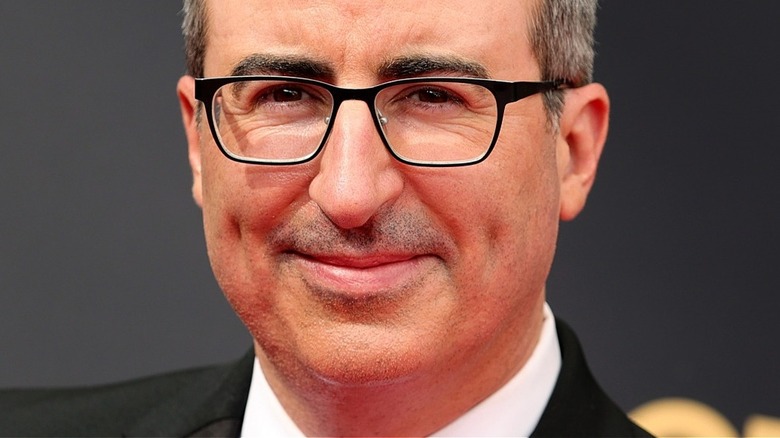Why John Oliver Just Called Out Kit Kat
John Oliver ripped into Nestle's Kit Kat during an episode of his weekly HBO news series "Last Week Tonight," in which Oliver puts an ironic spin on current events, per YouTube. Perhaps surprisingly, his laceration of Kit Kat came up in connection with the topic of carbon offsets. A carbon offset is a kind of "you break it, you buy it" thing with regard to carbon emissions — i.e., it's founded on the notion that if you emit carbon dioxide into the atmosphere, you can make up for it by investing in green efforts intended to remove carbon dioxide from the atmosphere (via Carbon Offset Guide). Carbon offsets are part of a larger climate action plan: net zero (not to be confused with the cable company of the same name).
"Net zero refers to a state in which the greenhouse gases going into the atmosphere are balanced by removal out of the atmosphere," according to the University of Oxford. Starting in 2016, with the adoption of the Paris Agreement by 192 countries plus the European Union (per United Nations), a state of net zero became an internationally accepted goal of climate action (per the U.N. Net Zero Coalition). The U.S. is a party, which is to say that the U.S. has made a "net zero commitment."
Do you know who else recently made a net zero commitment of sorts? That would be the company that manufactures Kit Kat. And, John Oliver is not fully on board.
Does Kit Kat know it's audience?
Just when we all thought we knew the whole untold truth of Kit Kat, the company comes up with a rather strange marketing campaign, according to television news satirist, John Oliver (per YouTube). Earlier this year, Kit Kat made its own net zero commitment, per a press release from its parent company, Nestle, which pledges that Kit Kat will become carbon neutral by 2025 and explains how it sets out to do that, including securing 100% renewable energy for its plants worldwide. Mostly, however, as Oliver points out, it seems that Kit Kat will be engaging in carbon offset.
"For any emissions that cannot be eliminated, the brand will invest in high-quality offsetting based on natural climate solutions," the press release states. It all sounds quite admirable, as Oliver points out that it should, given that Kit Kat saw fit to boast about it in a marketing campaign, which, presumably, it believes will appeal to its demographic. After all, isn't that what marketing is meant to do? And, therein lies the rub. As Oliver also points out, "it's not like you decide to eat a Kit Kat bar because of their net zero targets, but [rather,] you're at rock bottom and you've hit run out of Reese's Peanut Butter Cups."
That said, it seems that Oliver isn't perplexed by Kit Kat's marketing decision. He's more perturbed by the fact that Kit Kat is jumping on what Oliver believes is a questionable bandwagon.
Companies can earn a halo for what now?
Television news satirist, John Oliver devoted a recent HBO's "Last Week Tonight" episode to explaining the esoteric and highly math-driven concept of the carbon offset. He illuminated why it's a hot topic among world leaders and titans of industry, how it could affect climate change, and why it might be the most ludicrous thing he'd heard that week (per YouTube).
Oliver began with the unassailable fact that "carbon dioxide levels in the earth's atmosphere is now higher than ever in human history." He then went on to say that 1 in 5 of the world's 2,000 largest public companies has now made a net zero commitment. Sounds nice, except that Oliver has his doubts since companies like Kit Kat — whose net zero commitment seems to rely heavily on carbon offset — may "offset" running their businesses in a way that stops emitting carbon into the atmosphere. That said, Oliver had the same criticism for 200+ nations (counting all of the nations that make up the EU) that have signed on.
If investing a little money to "make your carbon footprint disappear sounds too good to be true that's because it absolutely is," as Oliver said. He makes a strong case as he debunks that notion with studies questioning the effectiveness of offsets in reducing emissions. He also points to companies like Disney investing in questionable projects that may not actually add value.


